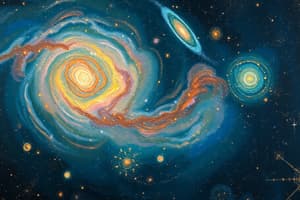Podcast
Questions and Answers
Which phrase best defines a galaxy?
Which phrase best defines a galaxy?
- Loose, disorganized star cluster held together by gravity
- Tightly packed group of older stars
- Large grouping of more than two stars
- Large collection of stars, gas, and dust held together by gravity (correct)
Which term refers to large groupings of stars?
Which term refers to large groupings of stars?
- Galaxies (correct)
- Nebulas
- Star clusters
- Binary stars
What phrase best defines a star system?
What phrase best defines a star system?
- A group of stars that formed around the same time
- A group of two or more stars (correct)
- A group of hundreds of stars
- A group of two stars in which one star is brighter than the other
Which type of star cluster forms from tightly packed groups of older stars?
Which type of star cluster forms from tightly packed groups of older stars?
Which characteristics describe a spiral galaxy? Check all that apply.
Which characteristics describe a spiral galaxy? Check all that apply.
Which sentences describe star clusters? Check all that apply.
Which sentences describe star clusters? Check all that apply.
Which statements accurately describe binary star systems? Check all that apply.
Which statements accurately describe binary star systems? Check all that apply.
Which feature is used to classify galaxies?
Which feature is used to classify galaxies?
Look at this image of a galaxy. Which type of galaxy is shown?
Look at this image of a galaxy. Which type of galaxy is shown?
Two types of spiral galaxies exist. A normal spiral galaxy is one kind. Which phrase best describes the second type of spiral galaxy?
Two types of spiral galaxies exist. A normal spiral galaxy is one kind. Which phrase best describes the second type of spiral galaxy?
Flashcards
Galaxy
Galaxy
Large collection of stars, gas, and dust held together by gravity.
Galaxies
Galaxies
Large groupings of stars in the universe.
Star System
Star System
A group of two or more stars that are gravitationally bound.
Globular Cluster
Globular Cluster
Signup and view all the flashcards
Spiral Galaxy
Spiral Galaxy
Signup and view all the flashcards
Star Clusters
Star Clusters
Signup and view all the flashcards
Binary Star Systems
Binary Star Systems
Signup and view all the flashcards
Galaxy Classification
Galaxy Classification
Signup and view all the flashcards
Elliptical Galaxy
Elliptical Galaxy
Signup and view all the flashcards
Barred Spiral Galaxy
Barred Spiral Galaxy
Signup and view all the flashcards
Study Notes
Galaxies
- A galaxy is defined as a large collection of stars, gas, and dust held together by gravity.
- Galaxies can vary in shape and structure, with some examples being spiral galaxies and elliptical galaxies.
Star Systems
- A star system consists of a group of two or more stars that are gravitationally bound.
- Binary star systems, a specific type of star system, contains two stars that may have differing brightness levels.
Star Clusters
- Star clusters are grouped collections of stars that can form in large quantities from the same nebula.
- There are two types of star clusters: globular, which are tightly packed older star groups, and open clusters, which are more loosely organized.
Spiral Galaxies
- Characteristics of spiral galaxies include a pinwheel shape, active star formation in their arms, and a significant amount of gas and dust.
- They are generally larger and can contain both new and older stars.
Classification of Galaxies
- Galaxies are classified based on their shape. Color, age, and size also serve as classification parameters but shape is the primary characteristic used.
- Examples include normal spiral galaxies and barred spiral galaxies, the latter having a distinct bar-shaped structure from which arms extend.
Binary Star Systems
- In binary star systems, stars might appear to wobble due to gravitational interactions, but they are not limited to two stars; multiple stars can exist within a complex system.
Characteristics of Star Clusters
- In star clusters, stars can be various distances from Earth, and while they generally form from the same nebula, the grouping can include stars formed at different times.
Notable Galaxy Types
- Elliptical galaxies have a smooth and featureless shape, distinguishing them from the more structured spiral galaxies.
- Irregular galaxies lack a distinct shape and can vary widely in appearance.
Studying That Suits You
Use AI to generate personalized quizzes and flashcards to suit your learning preferences.




